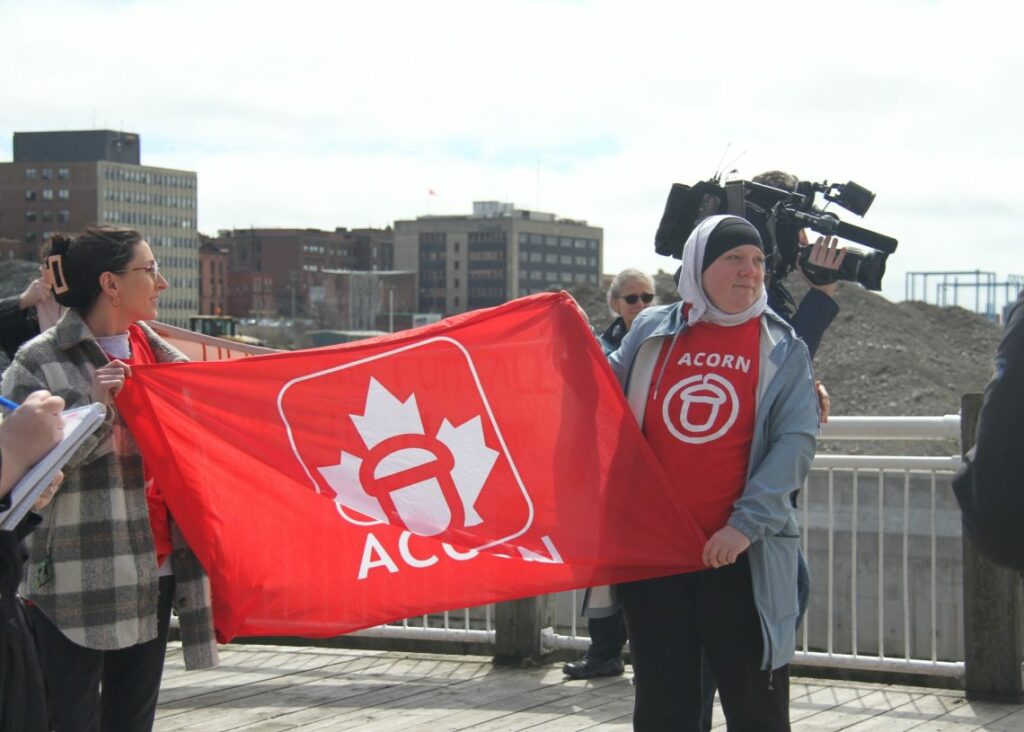NB Media Co-op: Tenant advocates push for policy solutions to housing crisis, not just more development
Posted June 15, 2023

As stakeholders gathered at the Saint John Trade and Convention Centre last month to discuss the future of New Brunswick housing, dozens of tenant advocates led by ACORN, a community union for low- and moderate-income people, held an outdoor rally to demand a reinstated rent cap.
The housing summit, hosted by the province, was criticized for lacking representation from tenants and small renters, making the protest stand out as a voice that raised concerns shared by most tenants.
Some politicians attended the rally, such as Saint John city councillors Brent Harris and Paula Radwan; Liberal MLA Benoît Bourque; and Green MLA Megan Mitton, who in a later interview with CHMA Radio in Sackville, noted that the summit was actually co-hosted by the New Brunswick Real Estate Association.
The president of the Canadian Union of Public Employee-New Brunswick (CUPE NB), Steve Drost, addressed the rally.
“This government is notorious for turning its back on the most vulnerable members of society. And that’s not what democracy looks like,” he said. “Democracy is supposed to take care of all of its constituents.”
ACORN leader Peter Jongeneelen offered a metaphor. “Trying to sell New Brunswickers on new ‘affordable’ housing legislation that does not include rent control within it is like building a car without installing brakes!”
Since 2021, ACORN and other housing advocacy groups in New Brunswick have been campaigning for a rent cap, leading to its adoption by the province in June 2022, seven months after Nova Scotia.
However, unlike the Nova Scotia Conservative government — which extended its two per cent rent cap until the end of 2023 and then increased it to five per cent until 2025 — the Higgs administration terminated the 3.8 per cent cap this year.
The New Brunswick government replaced the rent cap with a complaint-driven mechanism which allows the Residential Tenancies Tribunal to phase in rent increases that surpass the Consumer Price Index.
Angus Fletcher, who represented ACORN at the summit, stated that the more complicated system results in longer processing time and inconsistent implementation by the Tribunal, causing confusions, with massive rent increases being approved.
Fletcher offered two solutions that have been tested in various forms in six other provinces: capping rent at a fixed percent and having landlords apply for rent increases directly to the Tribunal.
“It’s a simple way to preserve the affordable housing stock we have left,” said Fletcher.
The NB Coalition for Tenants Rights and the Housing, Mobilization, Engagement and Resiliency Lab (HOME-RL) at UNB Saint John released a report showing the loss of 8,600 affordable housing units between 2016 to 2021 as capital funds and asset management firms began buying New Brunswick’s rental supply amidst historically low vacancy rates.
According to the report, the Higgs government’s off-hand approach has led New Brunswick to have “some of the highest rental inflation rates in the country since 2020, and its market remains largely unregulated.”
Nichola Taylor, the chair of ACORN-NB, explained that the trend has been going on for several years now. “They are talking about building more affordable housing, but as fast as they can build affordable housing is just as fast as we are losing affordable housing,” according to Taylor.
She pointed out that this is where rent control comes in to stabilize more affordable housing and make sure that renters are not affected by rent hikes.
ACORN and the NB Tenants Coalition advocate for the revision of the Residential Tenancies Act to increase protection for all tenants in New Brunswick, including the province’s subsidized housing, NB Housing.
They also proposed vacancy control, currently implemented in PEI, where rent control is tied to housing units instead of tenancy, to prevent landlords from evicting tenants to raise rent.
In an interview with CBC after the summit, Julia Woodhall-Melnik, the lead researcher at HOME-RL pointed out an important difference between smaller landlords “that have a couple units” and bigger landlords and Real Estate Investment Trust (REIT) companies, like the Killam and Historica, whose buildings have drastically increased in value in the past three years.
“Often what these REITs do is they buy a place, invest, they might change it a little bit, upgrade it a little bit, increase the rent… remortgage it. Take all that money out and reinvest it in another property… And the tenants who are paying rents are essentially paying down the mortgage,” explained Woodhall-Melnik.
Tenants under this situation often cannot know who their landlords are, which makes it difficult to hold them accountable for their actions.
To address this, ACORN is campaigning for a nationwide disclosure law that opens information on the building ownership of financialised landlords, who have bought up a massive number of federally-funded affordable apartment buildings.
ACORN also helps and encourages tenants to organize themselves into building-based tenants’ associations to defend tenants’ interest.
For the development of new affordable housing, Woodhall-Melnik pointed out that there are alternatives to low-cost “wartime” houses that were put into the spotlight at the summit.
“It could be a high-rise apartment with good quality conditions that are safe and affordable and great for people to live in, with parks in the backyard and near transit and to create active communities and engaged communities,” said Woodhall-Melnik.
According to Sarah Lunney, an ACORN spokesperson: “If we look at it in terms of a time of climate change, increasing more and more development on untouched land is not really a feasible solution. People need green space in their community and they also need affordable housing. So, just increasing development constantly is not going to affect people in the long run.”
Data Brainanta is a recent newcomer to Turtle Island from Indonesia who writes for the NB Media Co-op. He is also a member of the Association of Community Organisations for Reform Now (ACORN).
ACORN is a nationwide grassroots organization that represents the interests of middle- and low-income citizens. Its New Brunswick chapter holds regular online meetings on the second Tuesday of every month at 6.30 pm. Click here for more info and to get involved.
****
Article by Data Brainanta for NB Media Co-op

